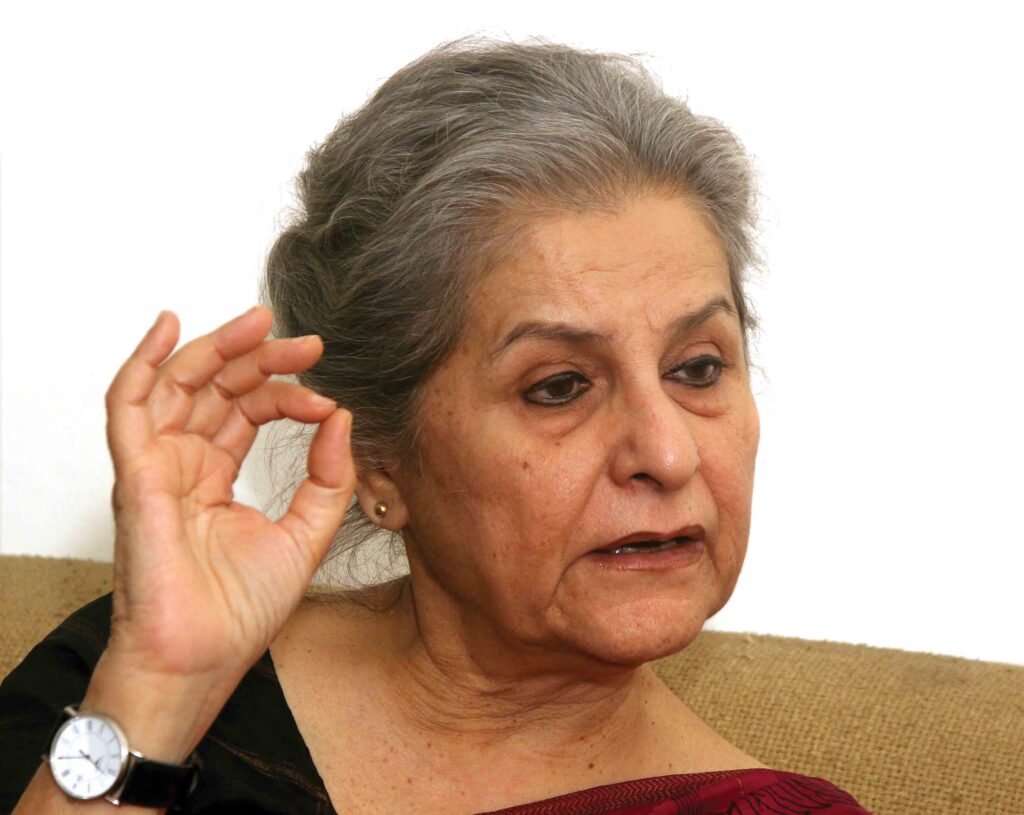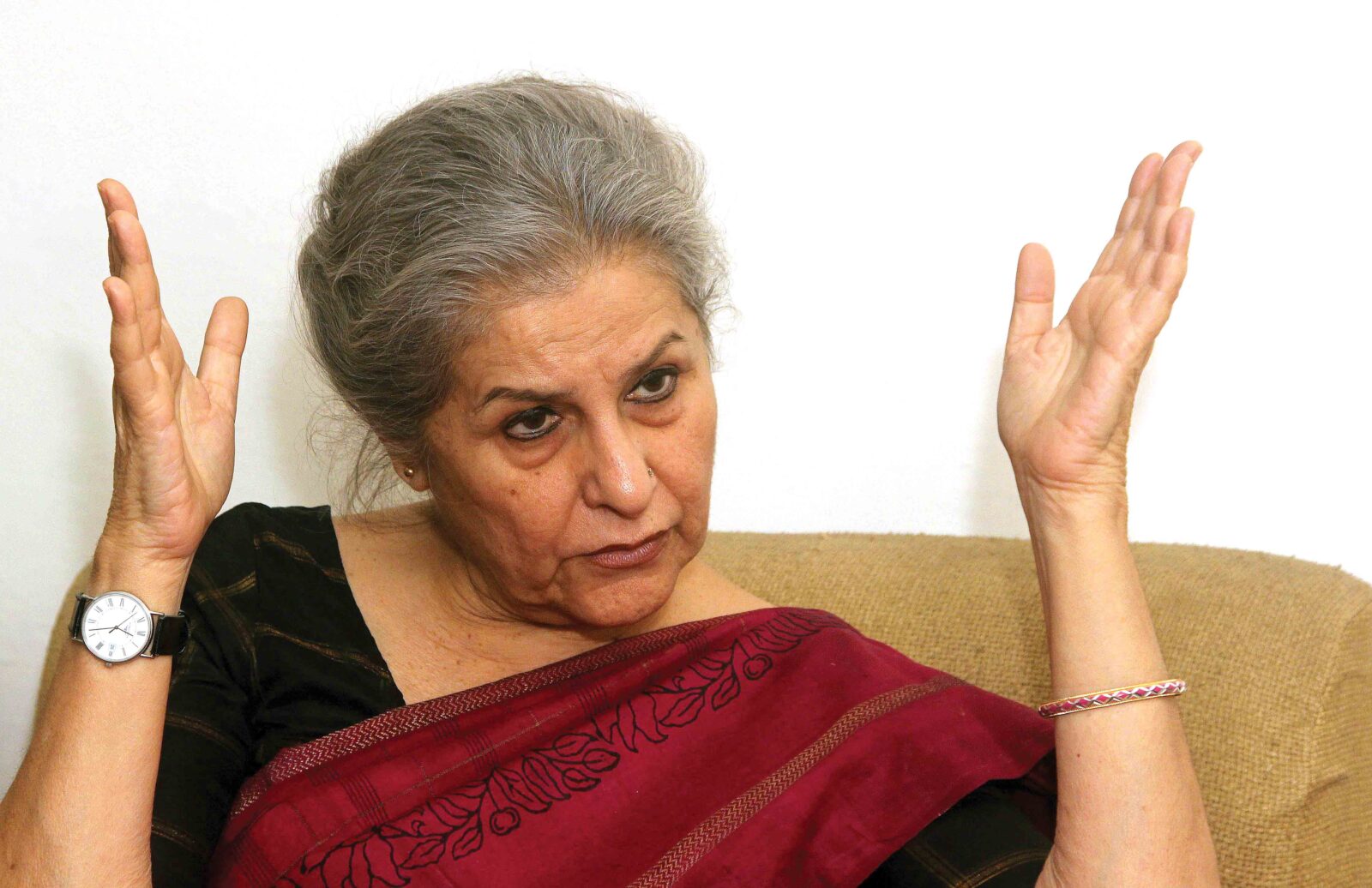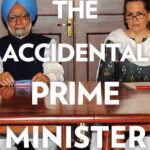gfiles: What has been left undone?
Syeda Hameed: I will begin on a positive note of what has been done. Our chapter in the Twelfth Plan which is called Women’s Agency and Child Rights has been universally acclaimed as an outstanding chapter. We have come a long way since it used to be called Women and Children Welfare or Empowerment and Development.
gfiles: What is the qualitative difference?
SH: The difference is that women are agents of their own change. So you give responsibility in the hands of women. Children are not recipients of development but they have rights. More important, we have placed nutrition higher on the agenda. Women and children bear the brunt of malnutrition. Also, we have developed a matrix where women and children are multi-sectoral. They are there in every sector, be it transport, energy, environment. Women’s concerns have to be addressed in every sector vis-a-vis policy and resources. This assigns responsibility to 33 departments of government to take their share of the load of women and children. This is the plan the whole country has signed: a multi-sectoral development of women and children. If civil society wakes up to this, it will hold the respective State governments accountable irrespective of parties. The tragedy is, everyone signs and it ends there. Then it is business as usual. We have a very forward-looking plan and there is a great responsibility on this country to ensure that gender and children do not get the customary treatment of gender budgeting or 33 per cent but actually are mainstreamed in a strategic manner to which everyone has consented.
gfiles: This is precisely the problem. The path which has been laid out is actually untravelled and untrodden. There is a gap between theory, the written word and action on the ground. So, isn’t it, in a sense, defeatist?
SH: You are right. It is defeatist. Therefore, if the State governments have committed, they must honour it.
gfiles: My sense is that the State governments do not even read what they have signed.
SH: Maybe because there are a lot of commitments. If the officers read what the politicians sign, they would probably advise them to have a rethink. So it is a self-perpetuating prophecy of no action on the ground. The way forward is that a vigilant public ensures that the commitments that are made are honoured both in terms of policy and resources. Nobody takes the planning exercise very seriously.
‘There is a lot more awareness and violence against women is now a global issue. Ten years ago, you could not raise the issue of women and children before some Chief Ministers because they were marginal issues.’
gfiles: Haven’t the government and the States failed to translate policy into action and, more important, without accountability? They sign because they want to be politically correct and not ignore gender. They don’t sign because they are committed.
SH: Another irony is that this particular meeting of the National Development Council (NDC) happened within days of Nirbhaya, so every State Chief Minister and the Prime Minister only spoke about ensuring zero tolerance for violence against women. So it was an NDC to do with gender and that was the NDC that signed this plan. But that is where it ended. The amount of commitment there was should have reflected in the nitty-gritty that was being played out in that meeting.
gfiles: Don’t you feel that these 10 years you have put in have been a no-show?
SH: It is certainly not commensurate with the work we have put in but it has moved forward. One, we will never go back to women and children development again. The fact is women are now regarded as agents; we will never go back to looking at the plan without a gender lens; we have introduced a gender lens in all the sectors. No government worth its name will be able to make a plan without looking at every sector through the gender lens.
Of course, there are lapses. A basic flaw is that the Ministry of Women and Child Development is not very high-profile. Why should it not have Cabinet status? Why should the person responsible for the destiny of women and children not have Cabinet status? When we say that women’s concerns should be mainstreamed, why should that person not be part of the entire decision-making? This is a basic flaw. What we need is a conceptual change. Then, why 33 per cent? Are you 33 per cent of the population or, with children, are you 65 per cent? Then there is a little bit of shortchanging also. You bill something as gender but when you deconstruct it, you do it for both. If you are making a road, you say it is for both, but when a woman walks a road there have to be toilets, lights and, therefore, you have to be sensitive to her needs.
gfiles: Yet zero results?
SH: It has not been as fast as it should have been. It is a slow machine and has not gathered speed. The Nirbhaya fund is with the Ministry of Home Affairs: it could have been in the Ministry of Women and Child Development.
gfiles: So actually, nothing has changed?
SH: Things have changed. There is a lot more awareness, violence against women is now a global issue. Ten years ago, you could not raise the issue of women and children before some Chief Ministers because they were marginal issues. But in later years these were raised and were responded to. Joh bachchon ki baat kabhi hoti nahin thi, woh hone lagi. Also, we could seek accountability and we were able to name and shame the States. That is a change, and progress. There is a forward movement but I feel it should have been much more and faster.
gfiles: What actually changed?
SH: What has changed is that women, children and nutrition have become big issues and are more upfront. Earlier, nutrition was never mentioned. Now we hammer it.
gfiles: You are the only woman member of the Planning Commission. It must be tough?
SH: Gradually, my male colleagues became aware and once issues were raised, they supported them. I would say that in the next Planning Commission, if there are 10 members at least five should be women. I have been the only woman for 10 years and I think this must change.
gfiles: There is no provision. It is government-dependent.
SH: There is no provision but there should be. The pressure has to come. Maybe it will change.
gfiles: Don’t you think that accountability and penal action must be woven in if State governments do not translate commitments into action?
SH: I think we need punitive powers; if States are not performing, you cut the budget. Right now, the Planning Commission has very little power. When I started out, I said why can’t we cut the budgets and everyone laughed and said there is a Gadgil formula, and you work according to that.

gfiles: Has there been any concerted effort to work towards that?
SH: Individual voices maybe, but institutionally, no. There is a counter argument that we, in any case, give little money, the rest the States generate. Phir thora paisa hi kam kar do. That also we cannot do.
‘In the next Planning Commission, if there are 10 members at least five should be women. I have been the only woman for 10 years and I think this must change.’
gfiles: Isn’t this a failure of policy and government?
SH: It is. The Prime Minister says the Planning Commission is an essay in persuasion. But there is no end to persuasion. States have become very strong now.
gfiles: States have become strong because the Centre is weak…
SH: The world is moving towards federalism. The smaller States need money but the big States are strong, so what can you do with them?
gfiles: Dr Singh’s policy of persuasion has failed. As against that, will Modi’s policy of cracking the whip work?
SH: Not necessarily. Federalism and identity politics are very strong and cracking the whip will never work.
gfiles: What will work then?
SH: Persuasion may still prevail. It is a slow process and does work. We need speed. By cracking the whip you will alienate everyone. So persuasion with a name and shame. I used to suggest that Parliament mein bahut bara map ho jahan constituency by constituency be earmarked where girls are being killed—khoon ka rang surk hona chahiye—and some states would be green and others would be blood-red.
gfiles: This government has done a lot of tokenism: first woman President, first woman Lok Sabha Speaker, but it stopped there…
SH: Glass ceilings did break and I think that is a step forward. It may not have filtered down.
gfiles: Do you leave your office with a heavy heart or a balance that kuch hua, kuch rah gaya?
SH: I leave with a balance.
gfiles: If the BJP comes to power with its anti-women stance, don’t you think the gender initiative will have
a setback?
SH: I don’t think this will be possible. Aberrations apart, the way the global dialect is now, I don’t think anyone can afford to ignore or trample on gender. When any party becomes government, they have to tread the path of reason.
gfiles: Have governments failed women?
SH: This government, of which I have been a part, has not. It made important policy movements and took extremely important landmark decisions, though much more could have happened and the acceleration should have been more.












































